While the Chinese land is filled with interesting landmarks and monuments to behold, one thing always catches tourists off-guard. And that is internet censorship that China is known for, which is conducted through its Great Firewall.
People living in this country are looking for the best VPN for China not only to increase their internet freedom but also to avoid excessive government surveillance and spying. With 10,000+ blocked websites in the country, enjoying the internet has become an afterthought.
What’s more, only a very small minority of VPNs actually work in the country due to the Great Firewall blocking even some of the most popular providers. Thus, it’s extremely hard to find a VPN that’s working in China.
The good news is that we did all the heavy lifting for you by testing dozens of them in this country. And today, I want to talk about the best VPN in China for 2025 that will work to provide maximum online freedom and online security.
7492 servers
118 covered countries
30 days money-back guarantee
10 simultaneous connections
3000 servers
105 covered countries
30 days money-back guarantee
8 simultaneous connections
3000 servers
100 covered countries
30 days money-back guarantee
Unlimited connections
Best VPN for China: Our Top 4 Favorite Providers
With the growing concern regarding privacy and online freedom in this country, the need for a VPN has become all the more prevalent. Don’t fret – you’ll know which provider for China to choose simply by looking down at my list.
1. NordVPN, the Best VPN in Mainland China
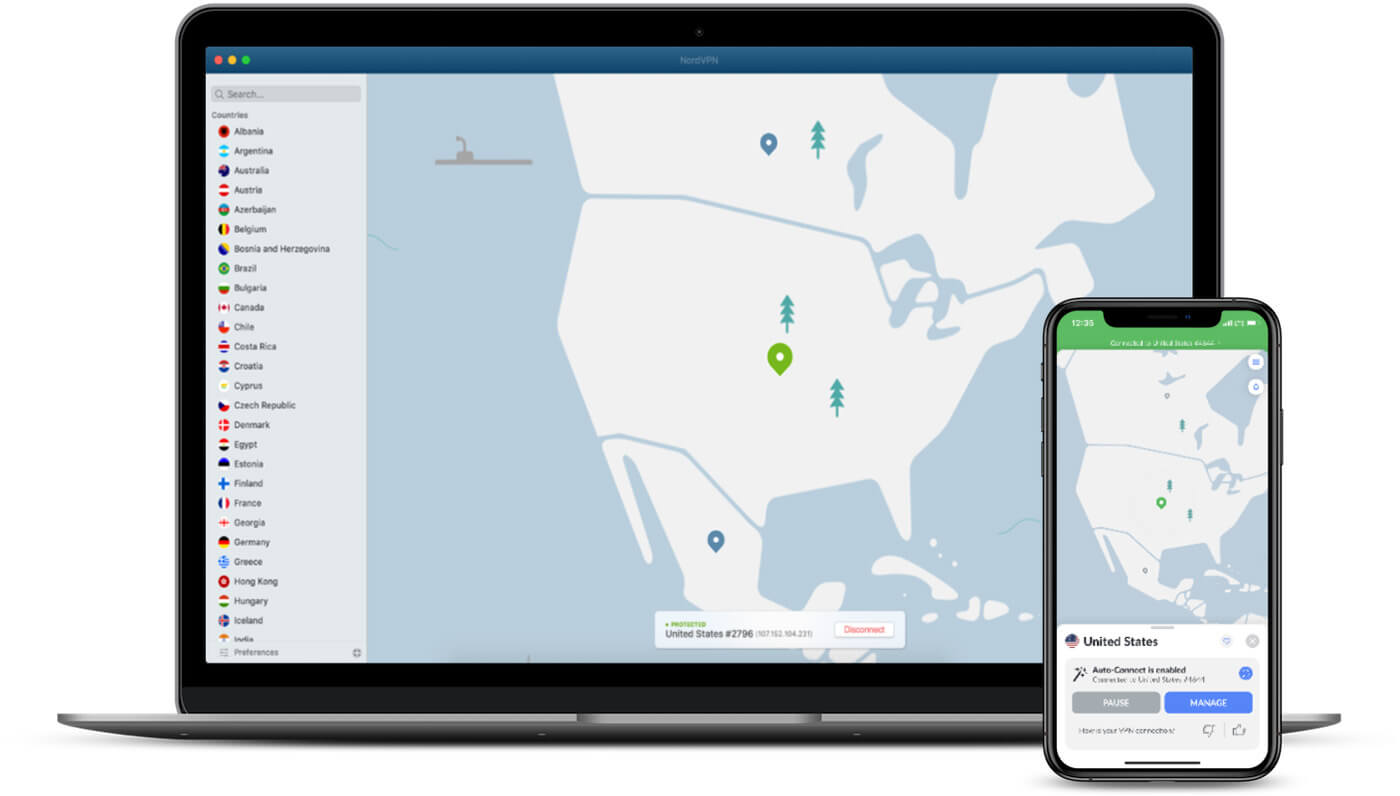
Pros
- Obfuscated servers bypass censorship in China
- The fastest VPN for China thanks to NordLynx
- Dark Web Monitor is useful for privacy
- Stores absolutely no logs
- Modern-looking apps for all platforms
- Double VPN servers
Cons
- Pricing in some countries is higher due to VAT
- Seldom issues with connectivity on Windows
The most popular and our #1 VPN that is working properly in China is NordVPN. This service offers a huge server network that spans 111 countries and counts 6,300+ servers globally. However, the main appeal here lies in one feature – obfuscated servers.
As its name implies, NordVPN applies obfuscation to these servers to be able to bypass the deep packet inspection (DPI) that’s typical in censored countries like this one. Once you enable them by choosing the OpenVPN TCP protocol, you’ll be able to choose from a wide array of servers.
In our tests, obfuscated servers showed amazing results in China, working at least 9/10 times with decent performance. The speeds are going to be amazing even with obfuscation, allowing for smooth gaming, streaming, torrenting, and web browsing.
Security-wise, NordVPN is filled to the brim with features. You get its proprietary NordLynx protocol, malware protection, ad blocker, NordLynx protocol, and even Dark Web Monitor for making sure your data never gets compromised online.
NordVPN uses 256-bit encryption as well and coupled with an automatic kill switch and IP/DNS leak protection, you’re sure to be completely anonymous in China. Not only that but NordVPN also stores no logs and has a certified no-logging policy.
As such, you can be sure that it won’t divulge any user-related information to the Chinese government. One thing I like about NordVPN is its device compatibility, as NordVPN offers modern-looking clients for any platform you can think of.
If we factor in 10 simultaneous connections, great streaming capabilities, and P2P servers, you get a pretty good package for a very affordable price. Speaking of which, its 2-year plans are very affordable and come with big discounts, making them cheaper than ExpressVPN’s non-flexible 1-year deal.
While there’s a 30-day money-back guarantee, I don’t like value-added taxes that can increase the price in certain countries.
Get NordVPN: It’s STILL Working in China!
2. ExpressVPN
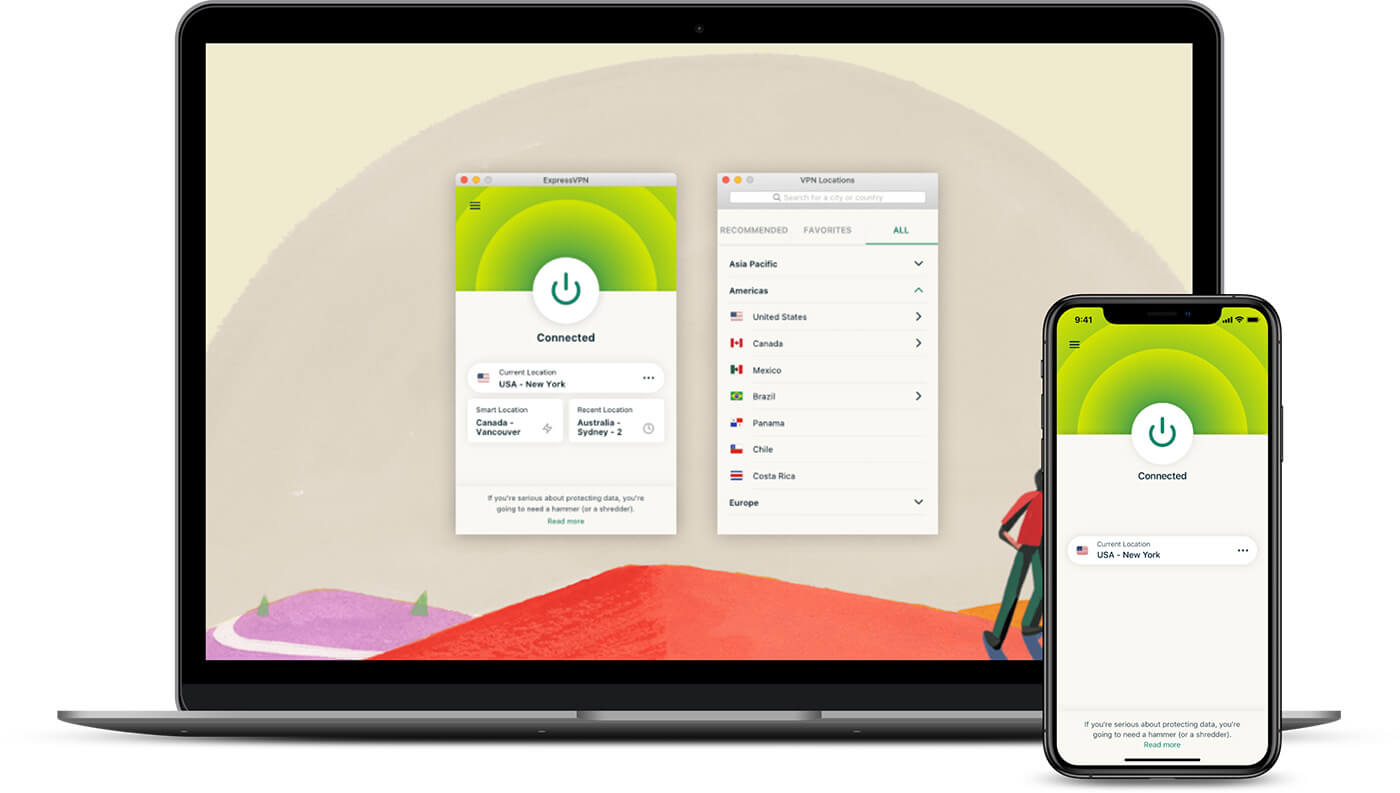
Pros
- Very reliable provider in censored countries
- Servers in 160 worldwide locations
- Advanced Protection for ad-blocking
- Lightway protocol increases security and performance
- Certified no-logging policy
Cons
- Not for users on a limited budget
- No Double VPN support
ExpressVPN is, in my experience, one of the most reliable providers you can use in this country. Apart from its 3,000+ servers in 105 countries, ExpressVPN has a lot more to offer. One of its features is 256-bit AES encryption for the highest level of security.
This, along with its obfuscation technology, allows ExpressVPN to slip through the Great Firewall’s defenses and work in China flawlessly. Our testers in this country tested ExpressVPN on multiple occasions, only to get a nearly perfect 10/10 score with this service.
Moreover, ExpressVPN offers a safe protocol (Lightway) that not only boosts security but also speeds up your connection. Obfuscation surely slows down your speed a bit, but while using Lightway, even in China, you’ll get awesome performance with no additional tweaks!
I also want to mention its kill switch that will prevent potential IP leaks in case of connection loss. Its no-logs policy gives you the confidence to use it in China, as ExpressVPN stores absolutely NO logs of any information that can be traced to you.
Needless to say, ExpressVPN has no bandwidth limits and it has apps for all platforms and devices. Thus, you can use this best VPN in China even on your smartphone or tablet, all while enjoying 8 simultaneous connections on a single subscription.
Mind you, ExpressVPN also works with Netflix in China, so you can do a bit of streaming if you want. Torrenting and browsing the dark web anonymously are other things you can do, as well as enjoy its round-the-clock 24/7 live chat support.
While not the most affordable choice, ExpressVPN isn’t going to milk you dry in terms of pricing. Its 49% discount and 3 free months for the annual plan stand as the cheapest deal on ExpressVPN.
Accompanied by a 30-day money-back guarantee for all plans, this deal makes ExpressVPN extremely affordable, with no significant downsides. If you want the absolute best China VPN, grab the deal through the button below!
Enjoy Anonymity in China With ExpressVPN
3. Surfshark
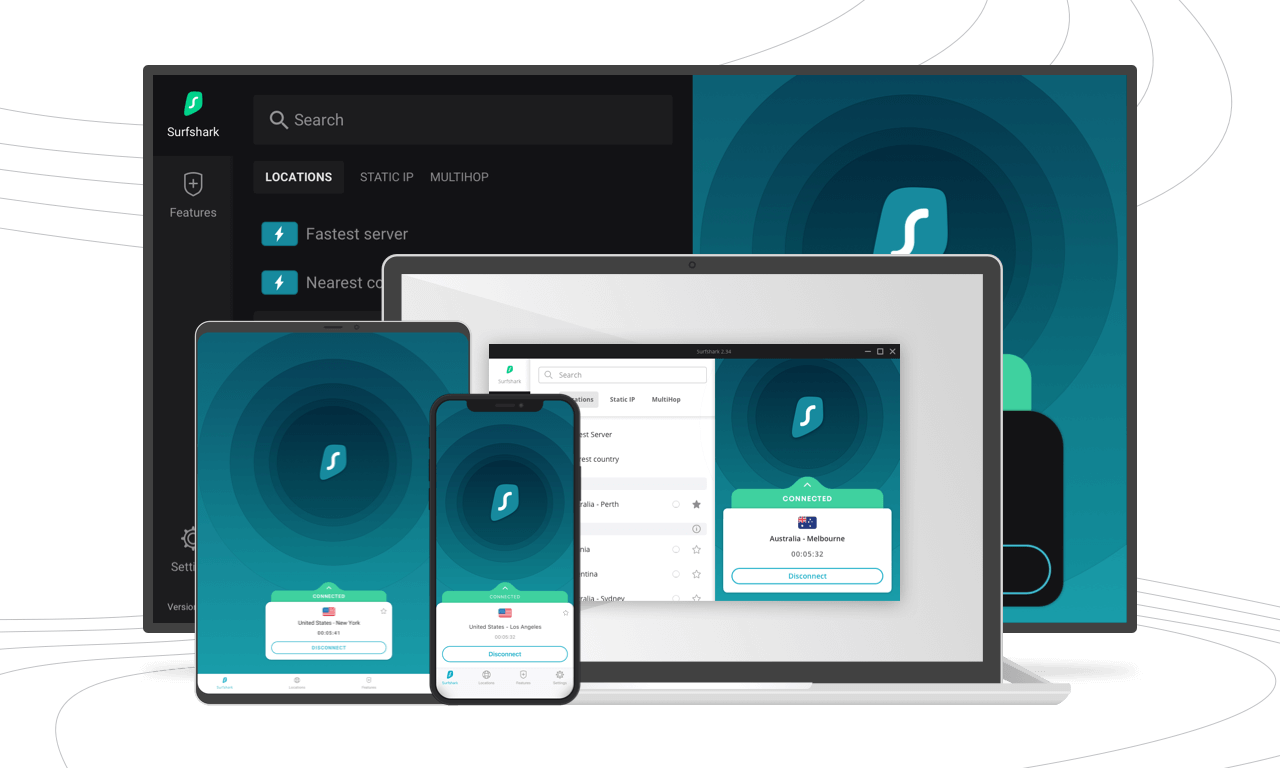
Pros
- Unlimited simultaneous connections
- NoBorders mode works well in censored countries
- WireGuard support
- Affordable prices for 2-year plans
Cons
- Not as reliable as NordVPN or ExpressVPN
- Speeds could be better
- Advanced security features cost more
If you’re looking for a cheap provider that’s working in China, you might want to consider Surfshark VPN. This service costs a pocket change per month, yet, it’s so feature-rich that you’ll find it hard to believe. But how good is it as a China VPN?
Well, I’d say it’s pretty good. It offers a NoBorders mode that masks your traffic and makes it seem like it’s ordinary, rather than the traffic coming from a Virtual Private Network. As such, enabling it means that you can easily bypass the Great Firewall and enjoy the internet in this country.
Granted, it won’t be as reliable as NordVPN or ExpressVPN. Our testers managed to get it working 8/10 times on average, but even this is a great score for a provider this cheap. Performance-wise, Surfshark isn’t the fastest compared to NordVPN.
In China, it won’t perform as well as outside of this country, but it’s far from being slow. Still, Surfshark VPN offers additional features like WireGuard, split tunneling, 256-bit encryption, and a kill switch. There’s also the Surfshark One plan with added features.
If you pay a dollar or so more a month, you’ll get antivirus, true incognito mode, and a few other features to make Surfshark even more secure in a country like this. Being based in the Netherlands, Surfshark’s jurisdiction screams privacy.
Hence, its verified no-logs policy makes it an even better choice for those looking to stay off the radar when residing in China. For me, the best thing about Surfshark is its unlimited number of simultaneous connections, which no other service on this list will give you.
Also, its 3,200+ servers in 100 countries are all P2P-friendly and can be used for streaming on Netflix or BBC iPlayer even in China. As said, this excellent VPN for China is really affordable, with its 2-year plan bringing a price of well under three dollars a month.
Of course, you get a 30-day money-back guarantee, in addition, so you can test it out risk-free. Do so by using the button below and you’ll be able to get its cheapest deal for maximum savings!
4. Private Internet Access
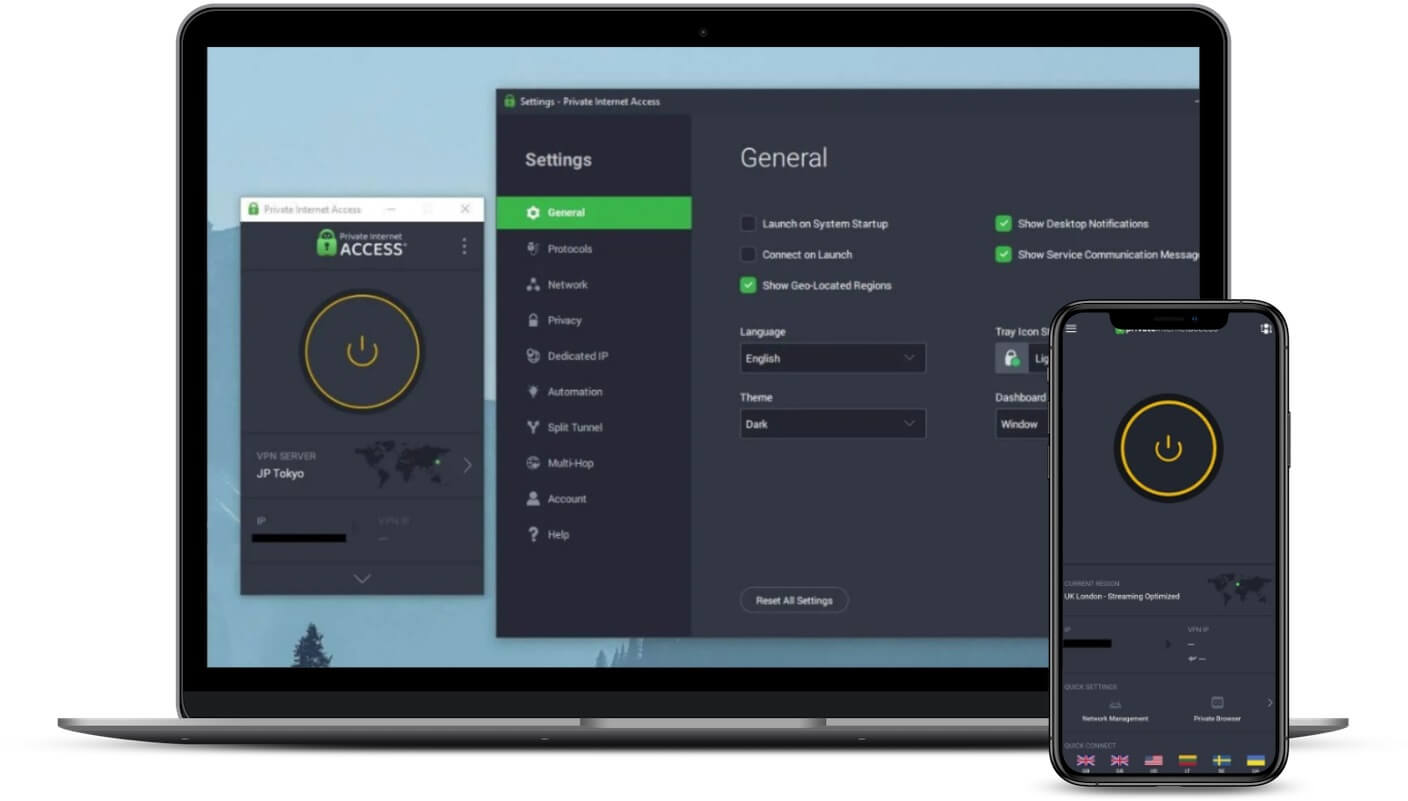
Pros
- 30,000 servers in 90+ countries
- It offers obfuscation to bypass censorship
- No-logging policy proven in court
Cons
- It’s not very fast
- Slow and clunky Windows application
- No native app for Fire Stick TV
Private Internet Access is a VPN provider based in the United States with some serious firepower. Despite its US jurisdiction, this is an incredibly safe and secure VPN with a no-logging policy proven in court multiple times, making it great for use in China.
Now, let us be clear that PIA VPN isn’t as reliable as the other 3 China VPN services on the list. However, it does work relatively well, as it offers obfuscation that allows you to slider under the radar of the Great Firewall and enjoy this provider without bigger issues.
Our testers reported that PIA VPN is working, on average, 7/10 times, due to particular issues with DNS that PIA VPN fixed so far. The provider has 30,000+ servers in 90+ countries and it’s the largest provider you can get, along with CyberGhost.
When using it in China, our testers detected that it’s a lot slower, however, but the good news is that you have servers in plenty of countries. Private Internet Access will work with some streaming services and it offers P2P servers, so you can even download torrents safely.
I like the addition of port forwarding, plus 256-bit encryption for securing your traffic. Private Internet Access also offers MACE – an ad blocker – and you get split tunneling, SOCKS5 proxy, Shadowsocks, and many other interesting features.
As said, it won’t be as reliable as the other 3 picks but hey, it’s VERY secure and offers apps for all platforms, except for Fire TV Stick. Yeah, quite a strange choice, but at least you’ll get unlimited simultaneous connections, which will be enough to protect all your devices.
Price-wise, we’re talking about a pretty affordable choice – even more so than Surfshark and CyberGhost. This makes it great for people on a budget looking to snag a 2-year plan at just above $2 a month and get a few free months on top of that.
Private Internet Access even boasts a 30-day refund period for all plans, so don’t hesitate to test it out risk-free and see what it can do in China!
Free VPN for China: Why They Don’t Work?
Apart from premium VPNs, the market has to offer a lot of so-called free providers. However, can you use a VPN in China if we’re talking about free providers? In short, you can’t, and there are quite a few reasons for that.
Free VPNs Don’t Have Obfuscation
The first and most important part is that free providers have no obfuscation. Obfuscation means hiding the fact that the traffic is originating from a VPN connection, which should “fool” the Great Firewall into “thinking” that it’s ordinary traffic.
As such, the firewall doesn’t react upon detection, giving you access to the internet space in the country. For a VPN to even work in this country, it must have this technology, as it allows you to bypass DPI (Deep Packet Inspection) in China and slip through the cracks of the firewall.
So far, I’ve tested hundreds of VPNs and I found that not a SINGLE free VPN will work in China for this exact reason (not even Windscribe, Hotspot Shield, TunnelBear, or Proton VPN).
Just to make it clear, many paid providers fail to obfuscate your traffic as well, so the majority of paid providers simply don’t cut it.
They’re Not Safe and Secure
If you’re looking for the best VPN to use in China in 2025, free services won’t be good enough because of their lack of security. Their encryption is often weaker, with the lack of features like a kill switch, IP leak protection, and a selection of protocols.
Not to mention their intrusive logging stances that often mean violating every bit of your privacy. Free providers like Hola VPN or Hotspot Shield will store logs of your browsing history and sell them to third parties, making sure they earn money from your personal data.
In China, it’s crucial to stay safe and secure while avoiding government surveillance and censorship… and free VPNs won’t give you this commodity.
You Can’t Use Them to Unblock Restricted Sites
Furthermore, free VPNs won’t let you unblock restricted websites and apps (Facebook, WhatsApp, Gmail, Instagram, Snapchat, Reddit, YouTube, Spotify, Google…). In my article about the best free VPN for Netflix, I proved that they don’t work with this platform. However, the problem doesn’t end there.
Even if they worked in China, they aren’t good at bypassing geo-restrictions. This would mean that, despite using a VPN, you still wouldn’t be able to watch Netflix US, HBO, BBC iPlayer, Hulu, or any other streaming service.
They’re Performing Poorly
To make things worse, a free VPN will perform very poorly in China. Not only are they very slow but they also limit your bandwidth to a few gigabytes a month. For instance, Windscribe gives you 10 GB a month while TunnelBear limits your bandwidth to 2 GB only.
While Proton VPN has unlimited bandwidth, it’s very slow AND it doesn’t work in China. Compromises like these would make the internet experience in this country a chore, with no space for enjoyment.
That’s why using premium VPNs is a much smarter choice, especially having NordVPN and its unrelenting performance in mind.
How to Use a VPN in China to Bypass Censorship
Using a VPN that is working in China is pretty simple and functions the same way as if you were using a VPN in any other country. However, there are a few important things to know, so let me go through the steps and teach you how to do it:
- Subscribe to a VPN. I recommend going for NordVPN and its 73% discount + 3 months free for the biennial plan. IMPORTANT: make sure you subscribe to NordVPN BEFORE you visit China to avoid having any issues in the country due to censorship and website blocks.
- Download and install a VPN on your device. Once again, all devices are supported, so before you visit the country, equip your devices with its applications.
- Open the VPN application and sign in using the credentials you gave when registering an account. Usually, it’s your email & password but you can also use the activation code that ExpressVPN provides if you don’t pick NordVPN.
- Once you arrive at the Chinese border, you need to connect to the server outside of this country. For example, you can use a VPN in China to connect to a server in the US, Canada, the UK, or any other country you want, depending on the content you want to access.
- Doing so, you’ll have an IP from the country you’ve chosen, and with an encrypted connection, The Great Firewall won’t be in effect, so you can browse the web to your heart’s contempt!
You can find more tips in our guide on how to use NordVPN in China.
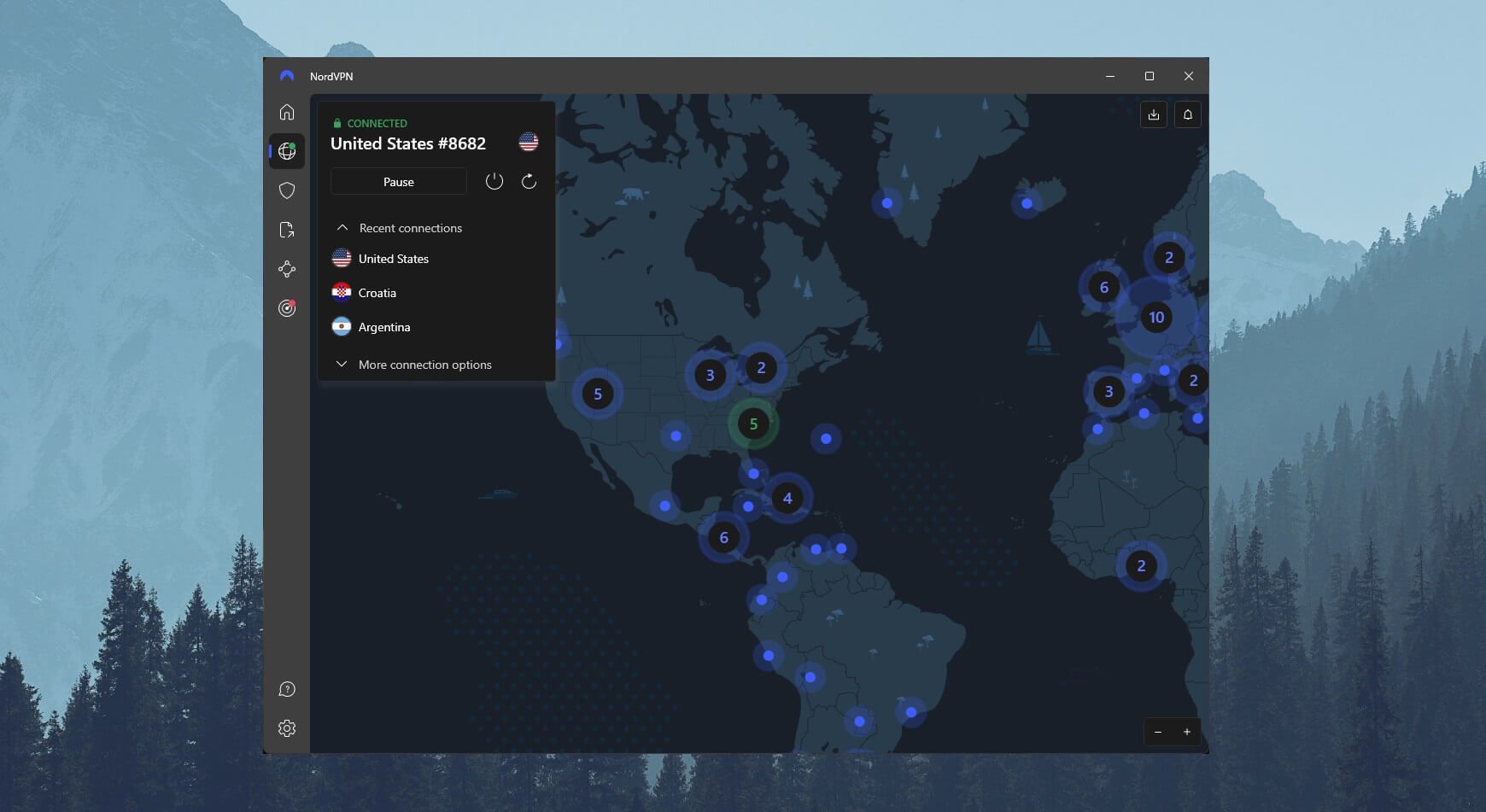
VPNs That Aren’t Working in China
While NordVPN, ExpressVPN, and Surfshark are very popular VPNs, there are many other relevant providers on the market that people usually go for. Unfortunately, many of them won’t work in the country, so I feel obligated to point that out.
CyberGhost
CyberGhost is a phenomenal VPN that costs less than Surfshark and offers more features. However, one feature that CyberGhost lacks is obfuscation, so it’s by no means a good China VPN. In fact, CyberGhost hasn’t been working in this country for more than a few years.
Therefore, if you plan on residing in this country for an extended period, my advice is to avoid CyberGhost. Instead, you can try a similarly-priced Surfshark option or simply go for NordVPN if you don’t want to take any chances.
Windscribe
Another popular VPN is Windscribe, but our tests showed that it isn’t very reliable in China. Its premium version used to work in China but in 2025, that’s not the case anymore. The same applies to the free version, which is a cut-down product of the paid version.
It offers limited bandwidth, poor performance, and a few server locations, making it not the best solution overall. Despite its solid security and a no-logs policy, Windscribe still won’t work in highly-censored countries like China.
Proton VPN
Even Proton VPN won’t work in China, in spite of offering various security features and technologies. And here, I’m referring to both the paid and free options of Proton VPN since they have minor differences in terms of security.
If you need a great VPN outside of this country, Proton VPN is a very good choice. However, if you need a great VPN for China, the three providers I talked about are much better.
Other 100% Free VPNs
I already talked about free VPNs for this country and why they won’t work. But to make sure I’m well understood, I’ll give you a brief list of free providers that you can’t use in China:
- Hotspot Shield
- Hide.me
- Hola VPN
- Betternet
- TurboVPN
- TunnelBear
- ZoogVPN, and many more…
Conclusion
The Great Firewall of China is an ever-present threat to online privacy and internet freedom in China. With a few recent improvements, The Great Firewall became a stronger weapon against VPNs, making the majority of them obsolete.
Whether you live in the country or you’re a tourist, getting the best VPN for China is imperative if you want these issues off your back. My favorite China VPN in 2025 is NordVPN given its high degree of reliability in China.
However, I found ExpressVPN, Surfshark, and PIA surprisingly compelling due to their decent performance and ability to bypass the Great Firewall. As long as you choose any of these VPNs and you stay clear of free VPNs, you shouldn’t have any issues.
Besides, all VPNs in our comparison offer a 30-day money-back guarantee for all their plans. So, if you travel to this country for 10 or 20 days, you can get a refund when you get back home and not lose a single dollar. If you ask me, that sounds more than fair!
Bypass censorship with NordVPN
Frequently Asked Questions
The topic of a VPN in China is very broad, so let’s complement this guide by addressing a few important questions related to it.
Is a VPN illegal in China?
Despite the government’s stance on VPNs, using a VPN in China is LEGAL. As we speak, there’s no official document or legislation that implies that using such a service is a crime and that you can be prosecuted as a result.
Many people in this country use a VPN successfully with no legal repercussions, so you don’t need to worry about that as long as you don’t use it for illegal online activities such as selling drugs or distributing copyrighted material.
Can you use a VPN in China?
Yes, you can use a VPN in China as long as you pick the right VPN for the purpose. Using a free VPN surely isn’t going to work but if you get a VPN with obfuscation, you’ll be able to bypass the Great Firewall and enjoy the internet freedom in the country.
With NordVPN, I can assure you that you won’t have any issues as the provider will work 100% of the time. The same could be said about ExpressVPN and its built-in obfuscation that works well for bypassing the Great Firewall without particular issues
Can China block a VPN?
Of course. The country blocks thousands of websites each day, where VPN providers AND their sites are on the list. Yes, you’ve read that well – even VPN websites are blocked, preventing you from subscribing to a VPN service.
That’s why you need to choose a VPN before visiting the country and get a subscription beforehand. Otherwise, you might run into this problem which requires a bit of improvisation to overcome.
Which VPN to use in China?
The best VPNs for China include NordVPN, ExpressVPN, Surfshark, and PIA VPN. However, some less reliable choices include VyprVPN and Astrill, both of which are more expensive than the three VPNs we mentioned.
How do I get a VPN in China?
If you live in this country and/or you failed to get a VPN before arriving in the country, you’ll have to be a bit resourceful. You can visit Hong Kong where most VPNs will work and get a subscription there.
Or you can book a night at a tourist hotel as these hotels are relatively uncensored. Once you connect to their WiFi, you’ll be able to visit the VPN site, subscribe, and enjoy the VPN in China afterward.
Which websites are blocked in China?
The Great Firewall is effective at blocking pretty much any website you use daily. There’s information that 8,000+ websites are blocked currently, but some say that this number increases by the day, so the exact number of blocked websites in China is unknown.
What we know is that ALL Google-related sites and services, along with ALL social media websites are completely inaccessible inside the Chinese borders. Here’s a small list of some of the most popular sites, services, and apps that you can’t access here:
- YouTube
- Google (including Google services like Gmail, Play Store, Docs, etc, etc.)
- Skype (instead, you get TOM-Skype that is under government monitoring)
- Tinder
- WhatsApp (for more information, see our article on how to use WhatsApp in China)
- Viber
- Zoom
- Flickr, and thousands more.